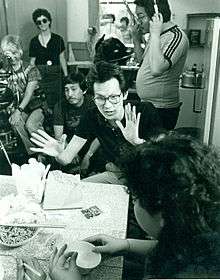Wayne Wang
Wayne Wang (traditional Chinese: 王穎; simplified Chinese: 王颖; pinyin: Wáng Yǐng; Jyutping: Wong4 Wing6; born January 12, 1949) is a Hong Kong–American director, producer, and screenwriter. Considered a pioneer of Asian-American cinema, he was one of the first Chinese-American filmmakers to gain a major foothold in Hollywood. His films, often independently produced, deal with issues of contemporary Asian-American culture and domestic life.
Wayne Wang | |||||||
|---|---|---|---|---|---|---|---|
 | |||||||
| Born | January 12, 1949 | ||||||
| Alma mater | California College of the Arts | ||||||
| Occupation | Director, producer, screenwriter | ||||||
| Years active | 1975–present | ||||||
| Spouse(s) | Cora Miao | ||||||
| Chinese name | |||||||
| Traditional Chinese | 王穎 | ||||||
| Simplified Chinese | 王颖 | ||||||
| |||||||


His best known works include Dim Sum: A Little Bit of Heart (1985), Eat a Bowl of Tea (1989), the Amy Tan literary adaptation The Joy Luck Club (1993), Chinese Box (1997), and A Thousand Years of Good Prayers (2007). Other films include the Harvey Keitel and William Hurt–starring comedy Smoke (1995), the family film Because of Winn-Dixie (2005), the romantic comedies Maid in Manhattan (2002) and Last Holiday (2006), and the controversial erotic drama The Center of the World (2001).
He is the recipient of numerous accolades, including a Bodil Award, a Silver Bear, two Golden Shells, with BAFTA Award, Sundance Grand Jury, Golden Lion, and César Award nominations.
Biography
Wang was born and raised in Hong Kong, and named after his father's favorite movie star, John Wayne.[1] When he was 17, his parents arranged for him to move to the United States to study, to prepare for medical school. Wang, however, soon put this plan aside when his 'eyes were completely opened' by new experience, and as he turned to the arts,[1] studying film and television at California College of Arts and Crafts in Oakland.[2]
Chan Is Missing (1982), Dim Sum: A Little Bit of Heart (1985), and Eat a Bowl of Tea (1989) established his reputation. He is best known for The Joy Luck Club (1993), Maid in Manhattan (2002), and the independent features Smoke (1995) and Anywhere but Here (1999). At the 2007 Toronto International Film Festival, Wang premiered two feature films, A Thousand Years of Good Prayers and The Princess of Nebraska,[3] as well as appearing in the Arthur Dong documentary film Hollywood Chinese.[4]
He won the Golden Shell at the San Sebastian Film Festival in September 2007 for A Thousand Years of Good Prayers.
In 2016, he won a Lifetime Achievement Award at the San Diego Asian Film Festival.[5]
Personal life
He is married to former Miss Hong Kong, and actress Cora Miao, and lives in San Francisco and New York City.
Filmography
References
- Lim, Dennis. "Wayne Wang, Bridging Generations and Hemispheres." New York Times. 12 September 2008.
- Mitchell, Elvis; Ed. Lia Chang (2000). "Fade to Black With Auteur Wayne Wang". AsianWeek (10 Aug – 16 Aug). ISSN 0195-2056. Archived from the original on 2008-10-15. Retrieved 2008-07-19.
Born and raised in Hong Kong, Wayne Wang came to the United States at the age of 17 to study painting, filmmaking and TV production at California College of Arts and Crafts in Oakland, Calif.
- G. Allen Johnson (October 18, 2008). "Wayne Wang's 'Princess' paves way on Internet". San Francisco Chronicle. Retrieved 2008-10-18.
His "The Princess of Nebraska," a San Francisco-shot tale of a young Chinese immigrant dealing with an unwanted pregnancy, is thought to be the first feature film by a major director to premiere – without a domestic theatrical or DVD release – on the Internet.
- Tong, Allan (2007). "Wayne Wang Interview". Exclaim! Magazine. Retrieved 2007-10-23.
- "SDAFF Award Winners | Pacific Arts Movement". pacarts.org. Retrieved 2018-04-27.
- "Chinatown Film Project | Museum of Chinese in America (MOCA)". www.mocanyc.org. Retrieved 2019-11-10.
- G. Allen Johnson (October 1, 2014). "'Soul of a Banquet': Wayne Wang's documentary on Cecilia Chiang". San Francisco Chronicle. Retrieved May 20, 2017.
External links
| Wikimedia Commons has media related to Wayne Wang. |
- Wayne Wang on IMDb
- Works by or about Wayne Wang in libraries (WorldCat catalog)
- Interview with Wayne Wang October 2011 at subtitledonline.com
- http://www.sfgate.com/cgi-bin/article.cgi?file=/c/a/2002/03/03/PK103945.DTL